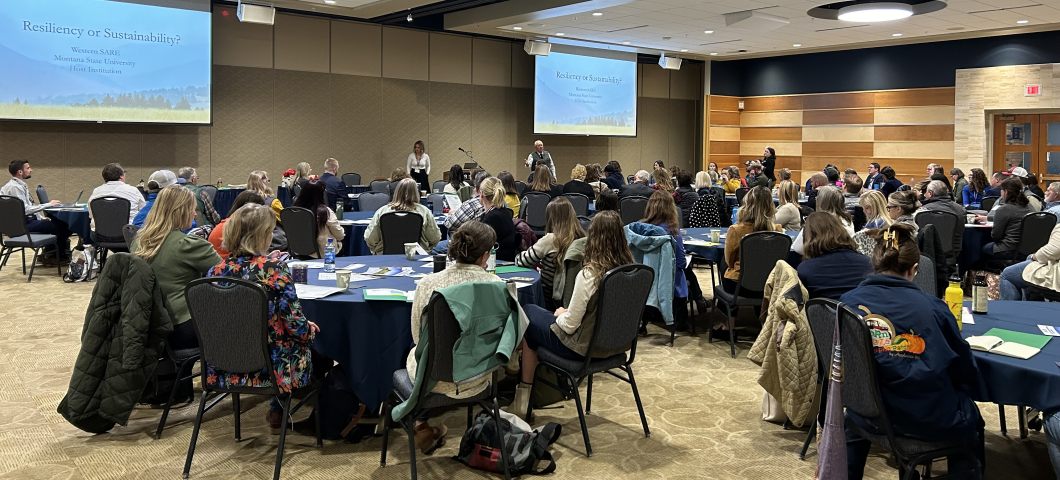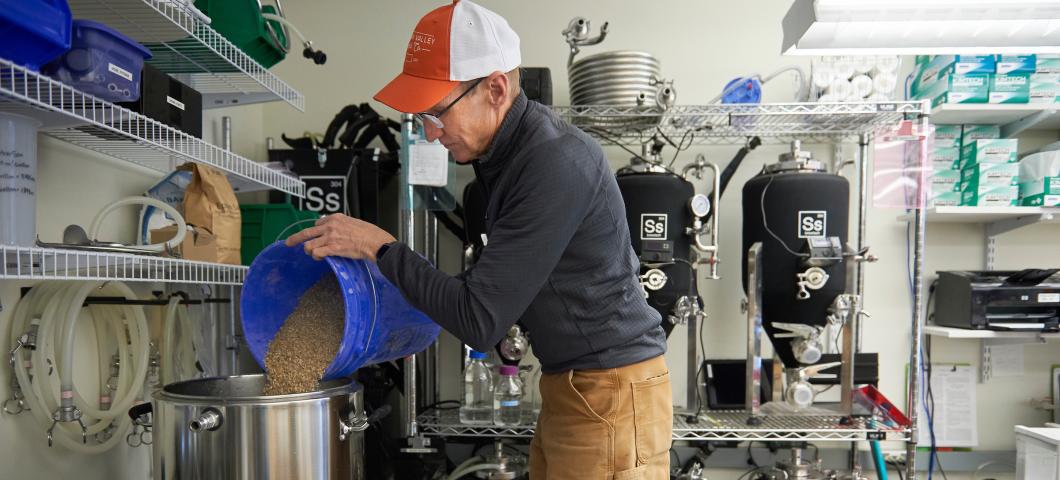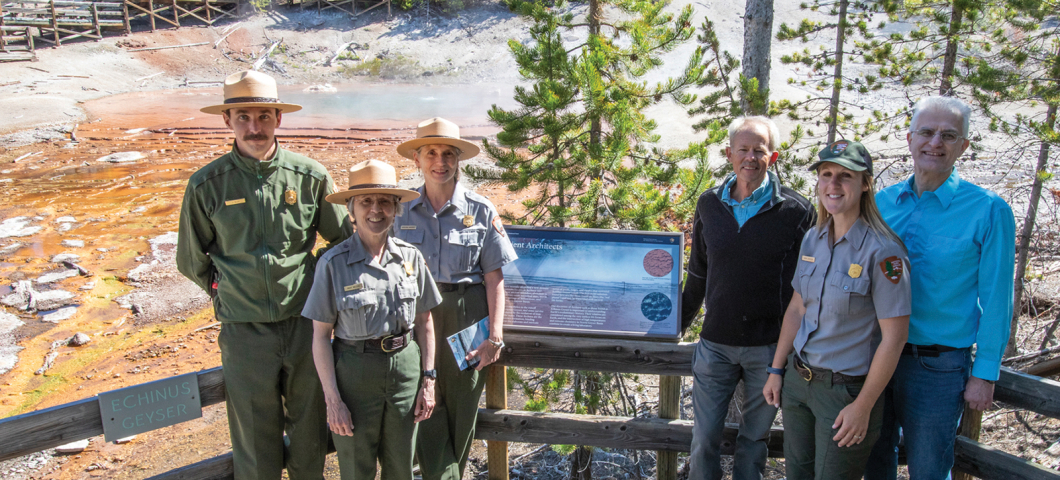Outreach and Engagement
Members of our agriculture family continue to conduct exemplary work in their communities to advance the Montana State University mission.

MSU hosted its first-ever agritourism conference in May 2024, welcoming agricultural producers, alumni and partners from around Montana.
Montana State hosts inaugural agritourism conference
By Reagan Cotton, MSU News Service
May 7, 2024
Montana State University hosted the inaugural Montana Agritourism Conference in May, the culmination of an 18-month program that connected agricultural producers with knowledge and resources to expand their offerings into the realm of tourism.
The event drew more than 130 attendees, including the 2024 class of Montana Agritourism Fellows. The fellows, made up of agricultural producers from across Montana, are part of the larger Montana Agritourism program, which is supported by the Montana Department of Agriculture and Western SARE, a regional research and education program focused on sustainable agriculture, for which MSU serves as the host institution.
“Montana provides an ideal location for agritourism by offering an unlimited selection of experiences that showcase the beauty of our rural life,” said Shannon Arnold, a professor in MSU’s Department of Agricultural and Technology Education who served as the conference organizer and led the Montana Agritourism Fellows program. “Today, we have the opportunity to engage in meaningful conversations, exchange ideas and learn from each other’s experiences.”
Read more about the Montana Agritourism Conference here.

MSU professor Carly Urban has spent more than a decade conducting and translating research on financial literacy to help educators and policymakers guide informed decisionmaking.
Carly Urban's research highlights benefits of financial literacy education
By Reagan Cotton, MSU News Service
March 8, 2024
Carly Urban, who has been at MSU since 2012, said that there had long been confusion among economists over which states required financial literacy education to be incorporated into high school curriculum. That confusion made it difficult for economists to make recommendations about financial literacy and get a full picture of the impact of those courses. In some areas, financial literacy was incorporated into a separate class, such as social studies or economics; elsewhere it was a stand-alone elective. Many states had no requirements at all surrounding the subject.
However, Urban said, many states are now beginning to require financial literacy education in high school. Urban said this shift is paying off for teens when it comes to their credit and debt behaviors.
“That’s where we see the biggest effect of financial literacy education. Credit scores get better, because people are less likely to be behind on an account. People are less likely to engage in alternative financial services, such as payday lending, which can really lead to poverty cycles,” Urban said. “We also see a big effect on initial student loan borrowing decisions. They’re less likely to use credit cards while they’re in school, and they’re more likely to get grants and scholarships – those up-front types of funding – rather than subsidized loans.”
Read more about Urban's financial literacy work here.

This spring, MSU received an academic brewing license, allowing the university to extend its barley research through the breeding, growing, malting and brewing processes.
Montana State barley research extends to brewing quality with new license
By Reagan Cotton, MSU News Service
March 4, 2024
Similar to the licensure used by commercial breweries, the license allows researchers in MSU’s Barley, Malt and Brewing Quality Lab to brew small amounts of beer as part of their research, identifying beneficial traits in new barley lines and evaluating how different varieties perform at each stage of the pipeline from field to brewery. MSU’s application for the license was approved on Feb. 28.
“Brewing is a complicated process that involves not only barley, but also the barley-growing environment, yeast and many other factors,” said Jamie Sherman, head of MSU’s barley breeding program and an associate professor in the Department of Plant Sciences and Plant Pathology in the College of Agriculture. “If we don’t understand this process, how can we possibly breed for it?”
For the past three years, more barley has been planted in Montana than in any other state, according to data collected by the U.S. Department of Agriculture’s National Agricultural Statistics Service. In 2023, 1.2 million acres of barley were planted in Montana. Barley has a variety of uses, and special lines can be bred for feed, forage and malting.
Read more about MSU's new academic brewing license here.

Bob Peterson received one of the Entomological Society of America's top recognitions honoring his decades of excellence in research and education.
Bob Peterson earns national recognition for entomology work
By Reagan Cotton, MSU News Service
September 15, 2023
Bob Peterson, head of MSU’s Department of Land Resources and Environmental Sciences in the College of Agriculture, was one of two individuals nationwide to be recognized by the Entomological Society of America with the title of honorary member, one of the highest recognitions the society bestows.
The title honors those who have significantly served ESA for at least 20 years and whose “involvement in the affairs of the society [have] reached an extraordinary level,” according to an announcement from the ESA. Recipients are selected by the society’s governing board and voted on by current members.
Peterson has been a member of MSU’s faculty for more than 20 years and became department head in 2022 after previously directing MSU’s professional master’s degree in environmental sciences. He teaches courses on environmental risk assessment, and his entomological research has resulted in more than 130 published papers and two books.
Read more about Peterson's research and outreach here.

Bill Inslkeep (third from right) and Mensur Dlakic (far right) collaborated with officials at Yellowstone National Park to install new educational displays at Norris Geyser Basin.
MSU scientists partner with Yellowstone National Park on new educational displays
By Reagan Cotton, MSU News Service
August 25, 2023
Long-term collaboration between Montana State University researchers and Yellowstone National Park’s Division of Resource Education and Youth Programs led to the installation of new educational displays at one of the park’s unique geothermal features last month.
Professor Bill Inskeep of the Department of Land Resources and Environmental Sciences and associate professor Mensur Dlakic of the Department of Microbiology and Cell Biology – both in MSU’s College of Agriculture – conducted ongoing research at Echinus Geyser in the park’s Norris Geyser Basin, with particular emphasis on newly discovered microorganisms that create the geyser’s characteristic red terraces composed of iron oxides.
That project culminated in the installation of two new educational displays on the boardwalks near Echinus Geyser in July. Norris Geyser Museum, and Echinus Geyser in particular, are visited by 25,000 to 30,000 visitors per week during peak times of June through August, according to park administrators. In the coming years the park estimates that millions of people from around the world will enjoy the displays.
Read more about Inskeep and Dlakic's collaboration with Yellowstone National Park here.
